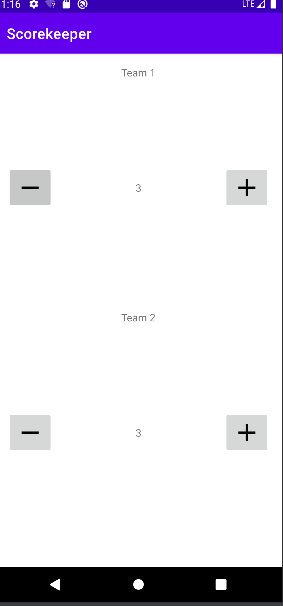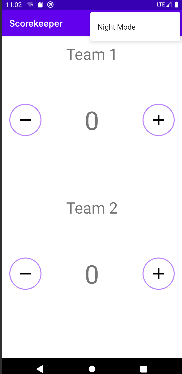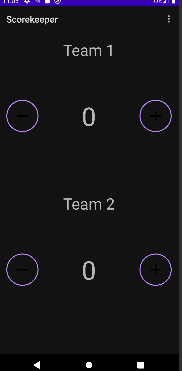非常容易学的android笔记6
Tue, Dec 20, 2022
2-minute read
Drawables, styles, and themes 功能
Drawables, styles, and themes教程
把基本的layout和元素都弄好,效果如图

before style
MainActivity.class
逻辑很简单
- 数值 int mScore1, 2;
- 数值 TextView mScoreText1, 2 ;
- onCreate() 方法是,把mScoreText1, 2和 activity_main 的TextView 的id绑定
- 把activity_main 的android:onClick=“decreaseScore”,“increaseScore” 方法完成
/**
* Method that handles the onClick of both the decrement buttons
* @param view The button view that was clicked
*/
public void decreaseScore(View view) {
// Get the ID of the button that was clicked.
int viewID = view.getId();
switch (viewID) {
// If it was on Team 1
case R.id.decreaseTeam1:
统一修改样式 button_background.xml
<style name="ScoreButtons" parent="AppTheme">
<item
name="android:background">@drawable/button_background</item>
</style>
<style name="PlusButtons" parent="ScoreButtons">
<item name="android:src">@drawable/ic_plus</item>
<item name=
"android:contentDescription">@string/plus_button_description</item>
</style>
<style name="MinusButtons" parent="ScoreButtons">
<item name="android:src">@drawable/ic_minus</item>
<item name=
"android:contentDescription">@string/minus_button_description</item>
</style>
改好后

style
白天黑夜模式
- 名称写好
<string name="night_mode">Night Mode</string>
<string name="day_mode">Day Mode</string>
- 菜单设置,有个黑夜模式
<item
android:id="@+id/night_mode"
android:title="@string/night_mode"/>
MainActivity.class设置
-
加onCreateOptionsMenu()方法
- getMenuInflater().inflate(R.menu.main_menu, menu);
- return super.onCreateOptionsMenu(menu)
-
选择类型 onOptionsItemSelected(MenuItem item)方法
+ if (item.getItemId() == R.id.night_mode) { // Get the night mode state of the app. int nightMode = AppCompatDelegate.getDefaultNightMode(); //Set the theme mode for the restarted activity. if (nightMode == AppCompatDelegate.MODE_NIGHT_YES) { AppCompatDelegate.setDefaultNightMode (AppCompatDelegate.MODE_NIGHT_NO); } else { AppCompatDelegate.setDefaultNightMode (AppCompatDelegate.MODE_NIGHT_YES); } // Recreate the activity for the theme change to take effect. recreate();
} ```
- 这里可以变了的,但是呢,名称没变,一直是黑夜模式,所以回到onCreateOptionsMenu()方法中,把return super.onCreateOptionsMenu(menu) 改一下
int nightMode = AppCompatDelegate.getDefaultNightMode();
if (nightMode == AppCompatDelegate.MODE_NIGHT_YES) {
menu.findItem(R.id.night_mode).setTitle(R.string.day_mode);
} else {
menu.findItem(R.id.night_mode).setTitle(R.string.night_mode);
}
return true;

night view
onSaveInstanceState()
这个比较重要,就是你选择了屏幕后,没有这个方法,数值就从 0 开始
- 记录数值 static final String STATE_SCORE_1 = “Team 1 Score”;
- onSaveInstanceState(Bundle outState)
- 储存数值
@Override
protected void onSaveInstanceState(Bundle outState) {
// Save the scores.
outState.putInt(STATE_SCORE_1, mScore1);
outState.putInt(STATE_SCORE_2, mScore2);
super.onSaveInstanceState(outState);
}
- onCreate()方法中,check savedInstanceState状态,如果不为空,从这里找数值
if (savedInstanceState != null) {
mScore1 = savedInstanceState.getInt(STATE_SCORE_1);
mScore2 = savedInstanceState.getInt(STATE_SCORE_2);
// Set the score text views.
mScoreText1.setText(String.valueOf(mScore1));
mScoreText2.setText(String.valueOf(mScore2));
}
